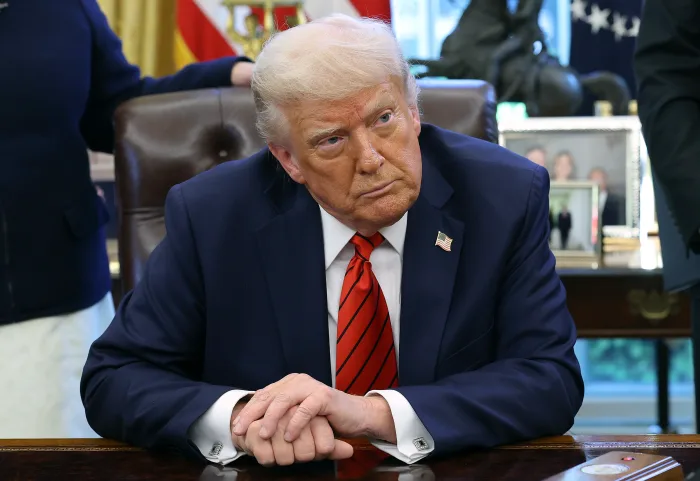Link copied
NXP Shares Fall After Announcing New CEO, Tariff Warning.
stock :: 2025-04-29 :: source - bloomberg
By Christina Kyriasoglou
(Bloomberg) -- NXP Semiconductors NV shares fell in premarket trading on Tuesday after the company announced a new chief executive officer as part of its quarterly earnings report and warned that tariff threats had created “a very uncertain environment.”
Most Read from Bloomberg
New York City Transit System Chips Away at Subway Fare Evasion
NYC’s Congestion Toll Raised $159 Million in the First Quarter
Newsom Says California Is Now the World’s Fourth-Biggest Economy
CEO Kurt Sievers, 56, will retire from the company late this year, the Dutch chipmaker said in a statement on Monday. Rafael Sotomayor, a current NXP executive, will take the president role immediately — on the way to becoming the new CEO on Oct. 28.
Tariffs announced by US President Donald Trump threaten to add further upheaval to the industry, which has been working through a backlog accumulated after the coronavirus pandemic. NXP’s peers, such as STMicroelectronics NV and Infineon Technologies AG, have struggled with weak demand for mature chips used in electric cars or smartphones.
NXP said Sievers, who has been CEO since 2020 and has been with the company for three decades, is leaving on good terms with the board. Sotomayor joined the company in 2014 from Broadcom Inc.
The shares tumbled about 8% in premarket trading on Tuesday before New York exchanges opened. They had declined 5.6% this year to close at $196.24 on Monday.
What Bloomberg Intelligence Says:
NXP CEO Kurt Sievers’ decision to retire at the age of 56 might signal increasing structural challenges at the company. We still expect NXP to be under stronger market-share pressure on some key products such as automotive microcontrollers, radars and secure car access.
— Ken Hui, BI senior technology analyst
As part of the report, NXP forecast that revenue will decline to $2.8 billion to $3 billion in the second quarter. That compares with an average analyst estimate of $2.86 billion, according to data compiled by Bloomberg.
The company said it has a “cautious optimism” that it can continue to navigate a challenging market. “We are operating in a very uncertain environment influenced by tariffs with volatile direct and indirect effects,” NXP said.
First-quarter revenue fell 9% to $2.84 billion, and adjusted diluted earnings per share in the period were $2.64 a share. Analysts had estimated $2.83 billion in sales and $2.60 a share in earnings.
Though tariffs have cast a pall over European chipmakers, the companies could benefit from a short-term boost in demand as customers place orders before potential new taxes are levied.
For the year, European chipmakers including NXP “might see meaningful risk,” Bloomberg Intelligence analyst Ken Hui wrote in a note this month. The Trump administration’s “reciprocal” tariffs could turn global semiconductor-market growth negative in 2025, he said. Consensus expectations had been for more than 10% growth.
Despite the downturn, NXP invested in acquisitions this year. The company agreed to buy Austrian software maker TTTech Auto for $625 million in January to develop more solutions for software-defined vehicles. NXP also announced the takeover of Kinara, a developer for processing units enabling AI applications, for $307 million in February.
Most Read from Bloomberg Businessweek
This week top market trends.
-
ECB holds rates unchanged, offers no clues about next move
2025-09-11 :: general :: reuters
:max_bytes(150000):strip_icc()/GettyImages-2153747675-c030878c75cd47d0bad8addd11901cc3.jpg)




